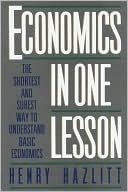More on this book
Community
Kindle Notes & Highlights
It is often sadly remarked that the bad economists present their errors to the public better than the good economists present their truths.
AMONG THE MOST viable of all economic delusions is the belief that machines on net balance create unemployment.
For William Felkin, in his History of the Machine-Wrought Hosiery Manufactures (1867), tells us (though the statement seems implausible) that the larger part of the 50,000 English stocking knitters and their families did not fully emerge from the hunger and misery entailed by the introduction of the machine for the next forty years.
The tariff has been described as a means of benefiting the producer at the expense of the consumer.
This is, as John Stuart Mill so clearly pointed out, that the real gain of foreign trade to any country lies not in its exports but in its imports. Its consumers are either able to get from abroad commodities at a lower price than they could obtain them for at home, or commodities that they could not get from domestic producers at all.
the real reason a country needs exports is to pay for its imports.
But when they limit the wages and the profits of those who make these commodities, without also limiting the wages and profits of those who make luxuries or semiluxuries, they discourage the production of the price-controlled necessities while they relatively stimulate the production of less essential goods.
What lies at the base of the whole effort to fix maximum prices? There is first of all a misunderstanding of what it is that has been causing prices to rise. The real cause is either a scarcity of goods or a surplus of money. Legal price ceilings cannot cure either.
Everyone as consumer buys a hundred different products; as producer he makes, usually, only one.
A common next step of legislatures, acting under merely political pressures or confused economic ideas, is to take rent controls off “luxury” apartments while keeping them on low or middle-grade apartments. The argument is that the rich tenants can afford to pay higher rents, but the poor cannot. The long-run effect of this discriminatory device, however, is the exact opposite of what its advocates intend. The builders and owners of luxury apartments are encouraged and rewarded; the builders and owners of the more needed low-rent housing are discouraged and penalized. The former are free to
...more
And this is our lesson in its most generalized form. For many things that seem to be true when we concentrate on a single economic group are seen to be illusions when the interests of everyone, as consumer no less than as producer, are considered.


